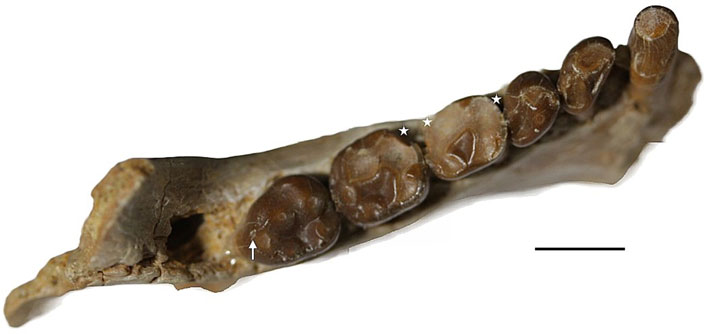 BURGOS, SPAIN—A new analysis of the teeth of early primates recovered from Egypt’s Fayum Depression, including those of members of the genera Propliopithecus, Apidium, and Aegyptopithecus, suggests that they ate mostly soft foods, such as fruit and insects, according to a Science News report. Dental anthropologist Ian Towle of Spain’s National Center for Research on Human Evolution (CENIEH) and his colleagues examined more than four hundred fossilized primate teeth dated to between 29 and 35 million years old. Only five percent of the teeth in the study had sustained damage visible to the naked eye. “That’s right at the low end of what we see in living primates,” Towle said. Monkeys that consume hard foods may have damage to as many as half of their teeth, he added. Decay in two of the Propliopithecus teeth could indicate that the soft foods may have been sweet fruits. Previous analysis of the shapes of Apidium and Aegyptopithecus teeth, however, suggested that these creatures ate hard foods, like seeds and nuts. “At the moment, we really don’t know why [different methods] are coming up with different results,” Towle said. “It’s definitely something that’s going to be interesting for researchers to look into.” Read the original scholarly article about this research in American Journal of Biological Anthropology. To read about monkey-made stone flakes that could be mistaken for human-made tools, go to "The Monkey Effect."
BURGOS, SPAIN—A new analysis of the teeth of early primates recovered from Egypt’s Fayum Depression, including those of members of the genera Propliopithecus, Apidium, and Aegyptopithecus, suggests that they ate mostly soft foods, such as fruit and insects, according to a Science News report. Dental anthropologist Ian Towle of Spain’s National Center for Research on Human Evolution (CENIEH) and his colleagues examined more than four hundred fossilized primate teeth dated to between 29 and 35 million years old. Only five percent of the teeth in the study had sustained damage visible to the naked eye. “That’s right at the low end of what we see in living primates,” Towle said. Monkeys that consume hard foods may have damage to as many as half of their teeth, he added. Decay in two of the Propliopithecus teeth could indicate that the soft foods may have been sweet fruits. Previous analysis of the shapes of Apidium and Aegyptopithecus teeth, however, suggested that these creatures ate hard foods, like seeds and nuts. “At the moment, we really don’t know why [different methods] are coming up with different results,” Towle said. “It’s definitely something that’s going to be interesting for researchers to look into.” Read the original scholarly article about this research in American Journal of Biological Anthropology. To read about monkey-made stone flakes that could be mistaken for human-made tools, go to "The Monkey Effect."
What Did Early Human Ancestors Eat?
